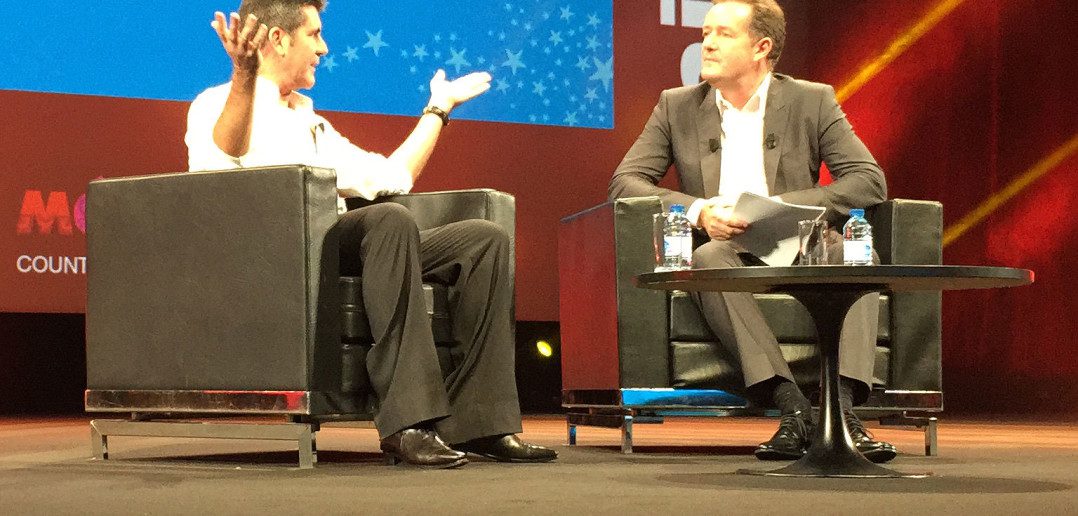Simon Cowell is this year’s MIPCOM Personality of the Year, which among its rewards included the chance to be grilled by his former Got Talent colleague Piers Morgan on the Grand Auditorium stage this afternoon.
« I haven’t had an audience this big for quite a while. I haven’t had any audience for quite a while, » quipped Morgan, as he introduced the session by talking about some of Cowell’s biggest successes, from shows like America’s Got Talent and X Factor to stars discovered through them like Susan Boyle and One Direction.
Morgan started the interview by asking about another Cowell production though: his son Eric. « He is fantastic, he’s only eight months old and he’s being very naughty, so I’m teaching him well! And we are priming him now to take over the business, » said Cowell. « But seriously, it’s been the most amazing thing that’s ever happened to me. »
Morgan asked Cowell to look back to his childhood, and say whether there was a moment when he wanted to be in entertainment. « No, not really. I loved going to the movies: it was my Saturday treat with my dad. I remember buying my first record – She Loves You by the Beatles. And I remember getting our first colour television… so when I left school with no qualifications, I knew it was one of those three that I wanted to work in. »
Cowell talked about his father, who worked for a long time at record label EMI, and how he’d advised Simon that « everybody has an invisible sign on their head that says ‘make me feel important’. And that carried through to my working life… on a production like X Factor, there are hundreds of people, and every single one of those people plays a part. And you have to recognise that part. »
The conversation moved on to the low point of Cowell’s career, when he was forced to go back to live with his parents and owed the bank around £500,000: « There are only two things that matter: stars and hits. And I didn’t have either of those… But in a way, it was the best thing that ever happened to me. Although I don’t want to do it again! »
Cowell talked about the inspiration behind shows like X Factor: « I was very concerned about the stranglehold that radio had on record companies: it really concerned me that my bands were always going to be in the hands of a radio programmer, » he said, before moving on to the question of whether he’s uncool. « Who cares? » he said. « That’s never bothered me. When you work for a record label: your responsibility is you make money for yourself, you make money for the company, and you have hits. »
For example, his work with TV stars Robson & Jerome, who had a string of hits that may not have been critically acclaimed, but were hugely popular. « I saw the power of TV, » he said, noting that the storyline in the show they were appearing in is what made people want to buy their record. « It was just part of the learning curve. I didn’t know what was coming next, but I did learn something from it. »
Cowell said that his personal tastes are the main critical yardstick for his shows. « You have to become the audience permanently, so when I’m editing and noting one of our shows, it has to be what I like, what I find emotional or funny, » he said. Morgan noted that Cowell has always been a straight-talker. « You can’t treat the audience like idiots. If somebody comes on stage and is literally tone-deaf, and if I say ‘take a couple of singing lessons and you’ll be a star’ they’ll think I’m mad! »
Cowell also took a pop at some rival talent shows. « We’ve got to a stage now with certain shows that the panels are so celebrity-driven… I always had a feeling about putting too many artists on a panel. Artists don’t want to find other artists. It’s not in them. But for me, I run a record label, so it’s all I want to do. »
Cowell praised his partners in the television world, including FremantleMedia. And he talked about his desire to keep generating new hits. « We say that one idea a year as good as Got Talent could pay for your next 20 years. It’s not much to ask for! »
The conversation turned to One Direction, who’ve sold more than 46m records so far and sold out arenas around the world. What was it about them that made them such a success, and how did Cowell approach the task of making them stars – remember, the members entered X Factor as individuals, before being put together into a band during the auditions. « I gave five people an opportunity to be in a group because I felt as a whole they’d have a better chance of being successful because they were so young and inexperienced, » he said. « The groups, I have to admit, were terrible that year… But I felt these guys could work together. To be fair to them, I gave them an opportunity, but it was the boys who ran with it. »
Cowell talked about his approach to work. « I am a perfectionist. The day that you stop caring and just let everything go out without you looking at it is the day that it’s over, » he continued. « I count myself incredibly lucky. It is work, but it’s a passion and it’s fun. I love doing it. »
Morgan asked about a recent failure: X Factor being taken off the air in the US. « The first year we made a really good series. Stupidly I said we were going to get 20 million. We actually got 12 million. If I hadn’t opened my big mouth… I believe that Fox and I gave up too early on this format. X Factor is the best music format in the world: it only takes one artist, be it a Susan Boyle or a One Direction, to turn things on its head… So I haven’t given up on X Factor in the US… You can bring these things back. »
Cowell says that he sees competition not just from music shows, but from any competitive show. For example, food shows – Great British Bake Off in the UK being one obvious example. « My belief is it’s more exciting to see someone like Leona Lewis win and sing a fantastic song, than looking at a chocolate eclair at the end of the show, » he said. Cowell is also getting more into movies, looking at things that can be « successful as films, but also to sell music… there’s so many of these shows with so many artists on, I look at something like High School Musical and think maybe that’s the route to go now. »
He admitted that it’s hard to come up with more shows as successful as X Factor and Got Talent. « Too many shows will kill the market, and what I’m seeing happening at the moment is it’s all about gimmicks: for me the show should be about the end… not the beginning. For me a show is not about a wall going up and down. »
What about the way many people are watching TV in other ways, on other devices and at different times? Morgan wondered whether this is a worrying trend for Cowell, given his history with live formats. « Everything’s an advantage, » he said. « If there’s new ways of watching our shows: laptops, phones, it’s only to our advantage. »




